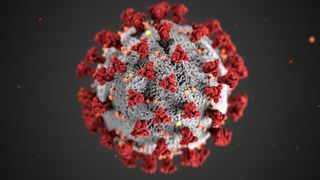

What do you do to stop a global pandemic? Act globally.
Viruses go everywhere in your body. The coronavirus will soon be everywhere humans live—which is a very big problem.
From Epidemic to Endemic
Viruses are promiscuous. They infect humans and many other animals (more later). They notoriously don’t stick to countries. They like to travel, hitchhiking on planes, ships, trucks, bicyclists.
But they like to settle, too.
When a disease settles in place, chronically infecting a population, it becomes “endemic.” It now has a better shot at permanence.
Many places with weak public health systems, like refugee camps or embattled rebel areas like Idlib in Syria, are ideal places for SARS-CoV-2 to camp out, kill, and stick around. Such a continuing viral presence represents a source to potentially infect or reinfect everyone else on the planet.
A permanent population presence also makes it easier for the virus to mutate. Sometimes it will be less virulent, sometimes more. But more mutations makes it easier to defeat all future vaccines.
Much has been written about how SARS-CoV-2 will “rewrite the rulebook” about economic globalization. The same is true of public health. We will need to act as we did with smallpox, working toward worldwide control and eventual eradication.
The group that normally coordinates such efforts is the World Health Organization. Like most UN outfits, it has many masters and problems. Now the highest elected official of its largest funder wants to cut off its money.
To combat a global epidemic that must be defeated globally, this may not prove wise.
The Economics of Survival
Prime Minister Boris Johnson of the U.K. had a real dilemma. He had won a victory as the apostle of Brexit, promising freedom from Europe and economic enhancement for “revitalizing” Britain.
SARS-CoV-2 looked disastrous for his economy.
With Dominic Cummings and other advisors, he came up with a novel plan to combat the virus: Build up herd immunity while protecting national businesses and the nation’s most vulnerable. Old folks of 70 and above were to isolate at home for four months. Ways of feeding them and getting them to a clinic or hospital were somehow to be worked out. Otherwise, life would go on as before until 60-70% of the population had been infected, giving presumably permanent immunity to most of the country.
His position changed when one of the major epidemiology groups that advises a sometimes-listening government pointed out that their models predicted 250,000 Britons would then die of the virus.
In a brief, striking, and effective speech, the prime minister made a U-turn. Everyone was to stay in place. No leaving home except for medical needs and food. No visits with family. No visits with friends. That’s all.
A few days later, Johnson and his health minister were infected. He continued to work vigorously despite high fever until hospitalized and placed in ICU. When he left the hospital, he pointedly explained that his life was touch and go.
People in Britain are now socially distancing as the body count mounts. It appears that individuals are willing to pay a high social and economic cost to stay alive.
This should be of some consideration as “lockdowns” are reversed. By socially distancing later than most countries, the U.S. will be able to watch how other nations fare. We can look to the actions of South Korea and Taiwan, which have controlled their epidemic using standard public health measures of testing, tracing, and tracking.
Taiwan, with about 5% of its population living in mainland China, the source of the SARS-CoV-2 epidemic, is now up to six deaths among its 23 million people.
National Vs. International
The WHO dislikes travel bans. They argue the epidemiology is clear: Once a non-source population is infected, the infection will run its course, while travel bans will prevent the sale and trade of needed medical equipment and drugs while undermining cooperation needed to control global epidemics.
It’s of interest that many in the United States believe a late January travel ban from China to the U.S. was an effective move that “protected” our population. Few have remarked that the ban was only of “foreign nationals” who came from or recently visited China. Those carrying American passports coming from China did not experience the ban.
Viruses can appear to be very smart. But are they smart enough to distinguish their victims by the passports they carry?
For those in suspense, they do not. People go everywhere, and the viruses with them.
The Culture of Narcissism
On March 13, the University of Texas shut classes due to SARS-CoV-2. Spring break began. Many were enticed to a trip to “escape the virus” and party by jetting to Cabo San Lucas in Mexico. When they returned, the original “group” of 70 holidayers contained 44 who tested positive. More recent reports say 49 out of 211 UT students tested positive.
UT administrators explained that the students had not risked only themselves. They had risked the lives of their parents and grandparents, friends and community. Half the admissions for COVID-19 to Austin hospitals were between the ages of 20 and 40.
Their import was simple: Everyone is in this together. No one is immune. Your health is everybody else’s health—even if you’re an invincible college student convinced you can’t infect Grandma.
Wild Animal Markets
The most ferocious recent human epidemics—AIDS, SARS, Ebola, MERS, SARS-CoV-2, have been propagated by viruses that “jumped” from other species. This has occurred for longer than humans have been human; perhaps 8% of human DNA is retroviral like the AIDS virus, which the sale of “bush meat” in Africa appears to have helped spread. With increasing populations and global climate change, humans abut closer and closer to wild animal environments. The present SARS-CoV-2 epidemic presumably started in bats and perhaps passed to pangolins, an endangered species of great interest to Chinese traditional medicine. The first victims of the virus, as noted by Dr. Li Wenliang, were workers in the wild animal markets, infecting their colleagues through person to person spread.
To prevent future epidemics such wild animal food sources should be strictly curtailed or outright banned. That will mean that populations that need those protein sources to survive will require other forms of food as replacements.
It is in the interest of all nations to see they get it.
Bottom Line: A global pandemic must be eradicated globally. Otherwise, many will die, and the pleasures of life may well diminish. Your health is my health, my health is yours. We’re in this together, whether we like it or not. Denial is not a strategy but a catastrophe.
Is it possible to control SARS-CoV-2 as effectively as we controlled smallpox?
We’ve done this before. With cooperation, we can do it again.
Empathy is a powerful human force. Now it can be harnessed to help keep all of us alive.
Can you fully enjoy a fine restaurant meal wearing a mask? Won’t it be nice to have the luxury to touch your face?
Your health is public health, and the world’s health is your own.



